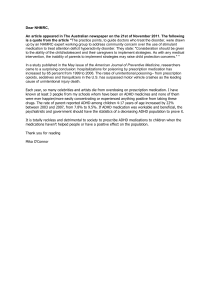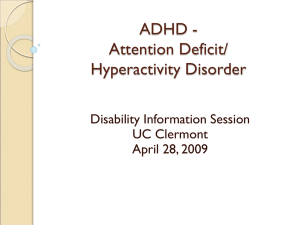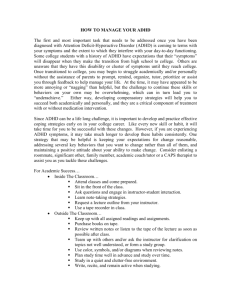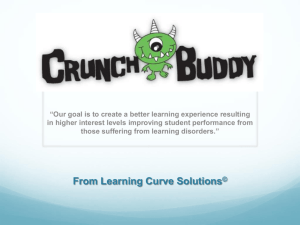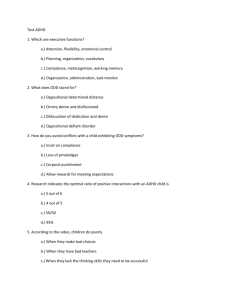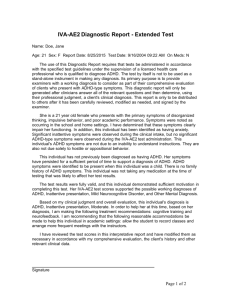Goodrich Sue Goodrich Nikki Mantyla English 1010 28 April 2014 Is
advertisement
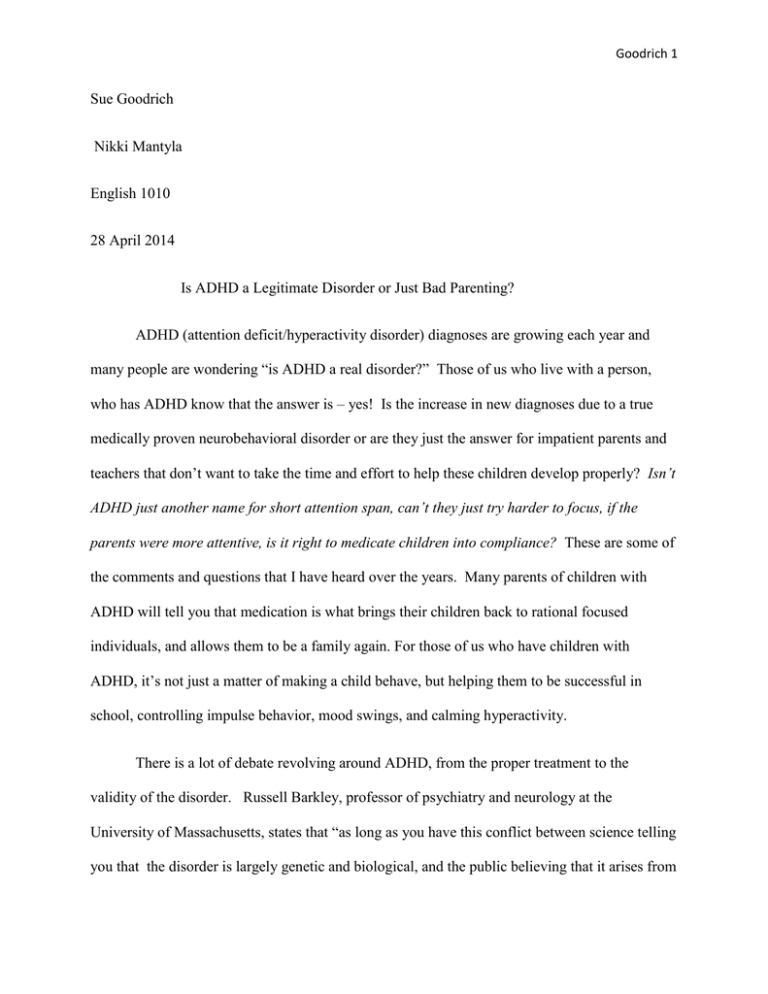
Goodrich 1 Sue Goodrich Nikki Mantyla English 1010 28 April 2014 Is ADHD a Legitimate Disorder or Just Bad Parenting? ADHD (attention deficit/hyperactivity disorder) diagnoses are growing each year and many people are wondering “is ADHD a real disorder?” Those of us who live with a person, who has ADHD know that the answer is – yes! Is the increase in new diagnoses due to a true medically proven neurobehavioral disorder or are they just the answer for impatient parents and teachers that don’t want to take the time and effort to help these children develop properly? Isn’t ADHD just another name for short attention span, can’t they just try harder to focus, if the parents were more attentive, is it right to medicate children into compliance? These are some of the comments and questions that I have heard over the years. Many parents of children with ADHD will tell you that medication is what brings their children back to rational focused individuals, and allows them to be a family again. For those of us who have children with ADHD, it’s not just a matter of making a child behave, but helping them to be successful in school, controlling impulse behavior, mood swings, and calming hyperactivity. There is a lot of debate revolving around ADHD, from the proper treatment to the validity of the disorder. Russell Barkley, professor of psychiatry and neurology at the University of Massachusetts, states that “as long as you have this conflict between science telling you that the disorder is largely genetic and biological, and the public believing that it arises from Goodrich 2 social causes, you’re going to continue to have tremendous controversy in the mind of the public” (par 20). In the 1950s and 1960s, extremely busy children were called hyperactive. Most people thought that this behavior was due to immature personality development (and that it would be outgrown) while others labeled it as bad parenting. In the 1970s and 1980s medical professionals discovered that these same children had problems with their attention span and impulse control: they were unable to stop and think before they acted. Eventually hyperactivity evolved into ADHD, which is now considered to be an actual developmental disorder. According to Barkley “ADHD is the most inherited of all the psychiatric disorders, rivaled only by autism” (par 5). I completely agree with this assessment. Not only am I the parent of a child with ADHD, but I am also a scout leader, and I see a very high percentage of our scout pack who have been diagnosed with this disorder. If you have ever spent quality time in a room with twenty plus boys, between seven and ten, it is quite easy to pick these children out of the group. Since ADHD is a relatively new disorder and becoming a very popular diagnosis, many wonder why it wasn’t such an issue for children in past years. The reality is that the diagnosis may be new, but as previously stated, the behaviors have been around for years. Instead of ADHD these children were labeled as dropouts, lazy, or, maybe even class clowns. These kids generally found jobs in the trades or the military. Some question that if these children were able to find ways to succeed before, without medication, then why medicate them now? The answer is that many of them didn’t succeed. Research shows that 25 – 50 percent of children with ADHD are held back by a grade in school and 37 percent will become high school dropouts. There is also a higher probability of teen pregnancies and drug abuse. Barkley’s response to these statistics is admirable: “My profession is not going to stand by and let children suffer like that – not when we have treatments that are knows to be effective” (par 35). Isn’t our goal as parents to Goodrich 3 teach our children and help guide them into becoming successful productive adults? If your child had a physical illness, wouldn’t you look for a treatment? Why is a mental disorder different? Many people don’t believe in treating ADHD because they don’t believe in the disorder. There is not a lab test available to confirm the diagnosis. Actually there are no lab tests currently available for any mental disorder, but that doesn’t make them less valid. Barkley emphasizes this fact when he states that “A disorder doesn’t have to have a blood test to be valid. If that were the case, all mental disorder would be invalid—schizophrenia, manic depression, Tourette’s Syndrom—all of these would be thrown out” (par 47). A pediatrician or psychiatrist can make a diagnosis of ADHD based on a thorough assessment of a patient’s history and symptoms. There is concern though, that a proper diagnosis can’t be made during the average 20 minute office evaluation by a pediatrician and psychiatric referrals are considered too costly for many families. To me this is not a well thought out argument. A new diagnosis of ADHD requires numerous trips to the pediatrician; evaluation, treatment plan and review of the treatment and its effectiveness are just the start. My son, Bryan, was first diagnosed in the 3rd grade. I could see that he was struggling in school and there were definitely behavioral issues at home. Ironically, I brought up my concerns at the same time that his teacher was expressing hers, during parent-teacher conferences. Bryan’s diagnosis was not just the result of a conversation between teacher and parent. I made an appointment with his pediatrician and we were given packets to fill out and assess Bryan’s behavior, moods, school performance, and basic mental health. Not only did we fill out a packet from our family perspective, but his teacher was required to complete a packet also. Bryan’s diagnosis was a result of collaboration between his family, educator and Goodrich 4 physician. I understand that ADHD has no medical test that can prove a diagnosis without the shadow of a doubt, but I do know that we saw a noticeable improvement in Bryan’s schooling, his attitude at home and definitely his impulse behaviors. My family and I know that ADHD exists, but so many are still questioning its legitimacy. I have heard people say that ADHD is just an excuse for parents who don’t know how to handle their children and that they are drugging them to make their own lives easier. How can perfectly normal children be diagnosed with ADHD, once they start attending school and misbehaving? Fred Baughman, a child neurologist, in private practice for over 35 years and medical expert for the Citizens Commission on Human Rights, suggests that it is the parents and teachers that should be evaluated for effectiveness and not the children. “It’s a terrible misstep not to require any correction of the adults who are responsible for the development of the child…and just accepting that it’s a chemical imbalance and you’re going to take a pill for it” (par 7). While I do agree that good/bad parenting can play a role in the actions of a child, I do not agree that children diagnosed with ADHD are the result of bad or ineffective parenting. Children with ADHD don’t just have behavioral problems they have difficulty thinking about the consequences of their actions. Good parenting is not a substitute for the missing voice in your head that says “if you do that, something bad will happen”. A high percentage of children with ADHD also have a second disorder known as oppositional disorder. This disorder makes them oppositional, defiant and sometimes difficult to manage. Training for both the parents and child are very effective in dealing with this disorder, but medication has shown to be most effective in managing symptoms of ADHD itself. Parents should be given all of the options to treat their child along with educational materials and information on support groups. Parent education and support classes for ADHD are available Goodrich 5 through therapists and Children and Adults with Attention Deficit/Hyperactivity Disorder (CHADD). The more educated and engaged the parents are, the more success and progress you will see in the child. Children need to know that although ADHD is labeled as a disability, is not an excuse to fail. This is a frequent conversation in our house. Diagnosis and an effective treatment plan should lead to higher expectations. By understanding the disorder, children can focus on working with and possibly overcoming their know obstacles. Are ADHD medications the answer for the child or the parent? Peter Breggin, psychiatrist and author of Taking Back to Ritalin writes “We have lost track of what childhood is about, of what parenthood and teaching are about” (par 10). Parents seem to be looking for perfect children while teachers are struggling with overcrowded classes and pressure to achieve higher standardized test scores. It is easy to see why children that aren’t keeping up with the mainstream struggle. To further his point, Breggin states “We’re in a situation in America in which the personal growth and development and happiness of our children, is not the priority; it’s rather the smooth functioning of overstresses families and schools…” (par 10). While I believe that the issues brought to the table by Mr. Breggin, are valid problems in society today, I do not believe that these issues are tied to ADHD diagnosis and treatments. I think that parents need to be aware of their children’s struggles. Identifying the problem, should include collaboration between parents, medical professionals and teachers. Harold Koplewicz, vice chairman of psychiatry at New York University and author of It’s Nobody’s Fault: New Hope for Difficult Children and Their Parents, points out that society used to blame mothers for the disorder because they were either inconsistent, lazy, working or getting divorced (par 2). Fortunately we no longer live in the dark ages and there are now medical explanations for ADHD behaviors. Koplewicz goes on to explain “These children Goodrich 6 really don’t have any easy time paying attention. It’s like telling a kid who has to wear glasses to squint and just try harder to see the blackboard” (par 2). I love this statement! I don’t think it could be stated any more basically. If your child couldn’t see, would you get them glasses? If the same child couldn’t pay attention and focus, wouldn’t you try to find a treatment to help them learn and succeed? Is medication the answer? Research has shown that stimulant medications such as Ritalin, Concerta and Adderall are effective treatments for hyperactivity, impulse control and focus. Some people have raised concerns that long-term use of stimulants is not safe for children. Barkley addresses this concern with the following response: “We know more about the stimulant medications than just about any other medication that is given to children in medicine. We know a lot more than we know about cough medicines, Tylenol, and other things that children swill when they come down with a common cold” (par 25). Stimulants seem to work by increasing brain activity in regions that are involved in inhibition. An additional concern is that stimulants are compared to cocaine, because they are chemically similar. Many critics play on this fact which is misleading. Cocaine is addictive because of how quickly it enters the brain. Stimulants like Ritalin and Adderall are absorbed gradually through the intestines and enter the bloodstream slowly. When these drugs are taken as prescribed, they are not considered to be addictive. There are many treatments that show positive effects on the symptoms of ADHD. Medication has shown very positive results for my son. I can’t say that I am not even remotely concerned about him becoming addicted to his medication because he avoids taking it as much as possible, on weekends. Some of the reasoning is basic teenage stubbornness and not wanting to be medicated daily, plus Adderall is an appetite suppressant and he really likes his food. He does understand that he functions better in school when taking stimulants. This was determined Goodrich 7 after he stopped taking his medication during 3rd quarter last year, and walked away with an impressive 1.8 GPA for the quarter. Medication is not the only change in our program. I have to be mindful not to overload him with instructions. Give one task at a time, organization is key to his success. When he’s overwhelmed he shuts down, and yelling at him does no good. Every child is different and at times these differences require modified parenting skills, children with ADHD require a bit more structure and restraint. Barkley shares the following consensus about the management of ADHD. “diagnosis, education, medication and accommodations are the standard, most useful, treatment package for this disorder” (par 44). As parents, we shoulder the blame whenever there are issues with our children, try our best, and frequently we learn as we go. There is not set rule book for raising children and creating a family. We will all make mistakes, but the answer here is that parents need to provide their children the necessities for them to become successful, productive adults. Whether it’s stimulant medication, natural supplements and diet restrictions, behavioral therapy (structure, reward, consistency), or even family counseling, the answer is not to do nothing. Watching and waiting will not cure a problem! Goodrich 8 Citations Barkley, Russell “Frontline” Medicating Kids: PBS. WGBH Educational Foundation 1995 – 2014 Baughmann, Fred “Frontline” Medicating Kids: PBS. 4 May 2000. WGBH Educational Foundation 1995 – 2014 Breggin, Peter “Frontline” Medicating Kids: PBS. 3 May 2000. WGBH Educational Foundation 1995 – 2014 Dodson, William “Frontline” Medicating Kids: PBS. 17 October 2000. WGBH Educational Foundation 1995 – 2014 Jensen, Peter “Frontline” Medicating Kids: PBS. 12 September 2000. WGBH Educational Foundation 1995 – 2014 Koplewicz, Harold “Frontline” Medicating Kids: PBS. 11 September 2000. WGBH Educational Foundation 1995 – 2014
